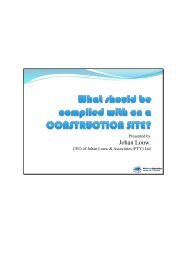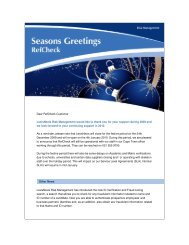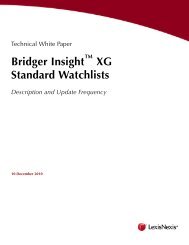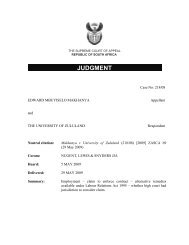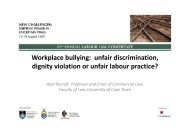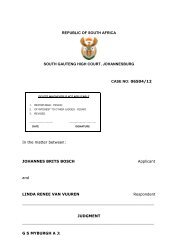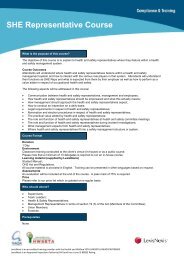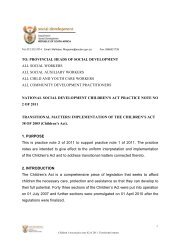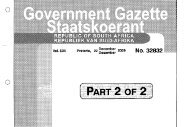Mogothle v Premier of the Northwest Province and others
Mogothle v Premier of the Northwest Province and others
Mogothle v Premier of the Northwest Province and others
Create successful ePaper yourself
Turn your PDF publications into a flip-book with our unique Google optimized e-Paper software.
MOGOTHLE v PREMIER OF THE NORTH WEST PROVINCE & ANOTHERVAN NIEKERK J [2009] 4 BLLR 331 (LC) 335• In any event, <strong>the</strong> applicant’s suspension (or “leave <strong>of</strong> absence” as itis described by <strong>the</strong> respondents) is valid <strong>and</strong> lawful.[4] In so far as <strong>the</strong> “breach <strong>of</strong> statute” component <strong>of</strong> <strong>the</strong> applicant’s claim isconcerned, that claim is founded primarily on what is referred to as <strong>the</strong>“SMS code”, a code <strong>of</strong> conduct governing senior management servicewithin <strong>the</strong> public service. It is not clear to me from <strong>the</strong> papers whe<strong>the</strong>r <strong>the</strong>SMS code is a statutory or o<strong>the</strong>r regulatory measure, or a collectiveagreement, or both. I am accordingly unable, in this respect, to discernany clear right that might stem from <strong>the</strong> code as statute.[5] In so far as <strong>the</strong> applicant’s claim is based on PAJA, <strong>the</strong> judgment <strong>of</strong> <strong>the</strong>Constitutional Court in Chirwa v Transnet Ltd & o<strong>the</strong>rs 2008 (3) BCLR251 (CC) [also reported at [2008] 2 BLLR 97 (CC) – Ed] casts significantdoubt on whe<strong>the</strong>r public sector employees have <strong>the</strong> right to claim that <strong>the</strong>exercise <strong>of</strong> a contractual power by <strong>the</strong>ir employers, where that conduct isconcerned with labour <strong>and</strong> employment relations, constitutes administrativeaction for <strong>the</strong> purposes <strong>of</strong> PAJA. The majority judgments <strong>of</strong> SkweyiyaJ at paragraph [73] <strong>and</strong> Ngcobo J at paragraph [150] both hold that aremedy under section 33 <strong>of</strong> <strong>the</strong> Constitution <strong>of</strong> <strong>the</strong> Republic <strong>of</strong> South Africa,1996 is not available to public sector employees who complain <strong>of</strong>unfair conduct by <strong>the</strong>ir employers. Both judgments expressly leave open<strong>the</strong> question whe<strong>the</strong>r PAJA affords a remedy in <strong>the</strong>se circumstances. Inhis minority judgment (at paragraph [194]), Langa CJ expressly states thathis conclusion that Chirwa’s dismissal was not administrative action underPAJA should not be construed to mean that dismissals <strong>of</strong> public sectoremployees would never constitute administrative action under PAJA. Afuller discussion on <strong>the</strong> interpretation <strong>of</strong> <strong>the</strong> Chirwa judgment follows below,but for present purposes <strong>and</strong> for reasons that will become apparent, Ido not regard it necessary to determine whe<strong>the</strong>r <strong>the</strong> applicant has a remedyunder PAJA, 1 <strong>and</strong> consider only that part <strong>of</strong> <strong>the</strong> applicant’s claim thatis founded in contract.[6] The facts giving rise to this dispute are largely common cause. Theirsubstance is set out below.[7] The applicant was employed by <strong>the</strong> department with effect from 1 April2006. He answers to <strong>the</strong> first respondent (“<strong>the</strong> <strong>Premier</strong>”) <strong>and</strong> also to <strong>the</strong> secondrespondent (“<strong>the</strong> MEC”), to <strong>the</strong> extent that <strong>the</strong> <strong>Premier</strong> has delegated herpowers to him. The applicant’s contract incorporates a number <strong>of</strong> statutory<strong>and</strong> o<strong>the</strong>r regulatory provisions, including, it would seem, <strong>the</strong> SMS code. Thepart <strong>of</strong> <strong>the</strong> code relevant to <strong>the</strong>se proceedings reads as follows:“Precautionary suspension or transfer(a) The employer may suspend or transfer a member on full pay if–• The member is alleged to have committed a serious <strong>of</strong>fence. And,• The employer believes that <strong>the</strong> presence <strong>of</strong> a member at <strong>the</strong>workplace might jeopardise any investigation into <strong>the</strong> alleged misconduct,or endanger <strong>the</strong> well being or safety <strong>of</strong> any person or stateproperty.ABCDEFGHI________________________1 The tenor <strong>of</strong> <strong>the</strong> majority judgments is that <strong>the</strong>re is no such right.J




